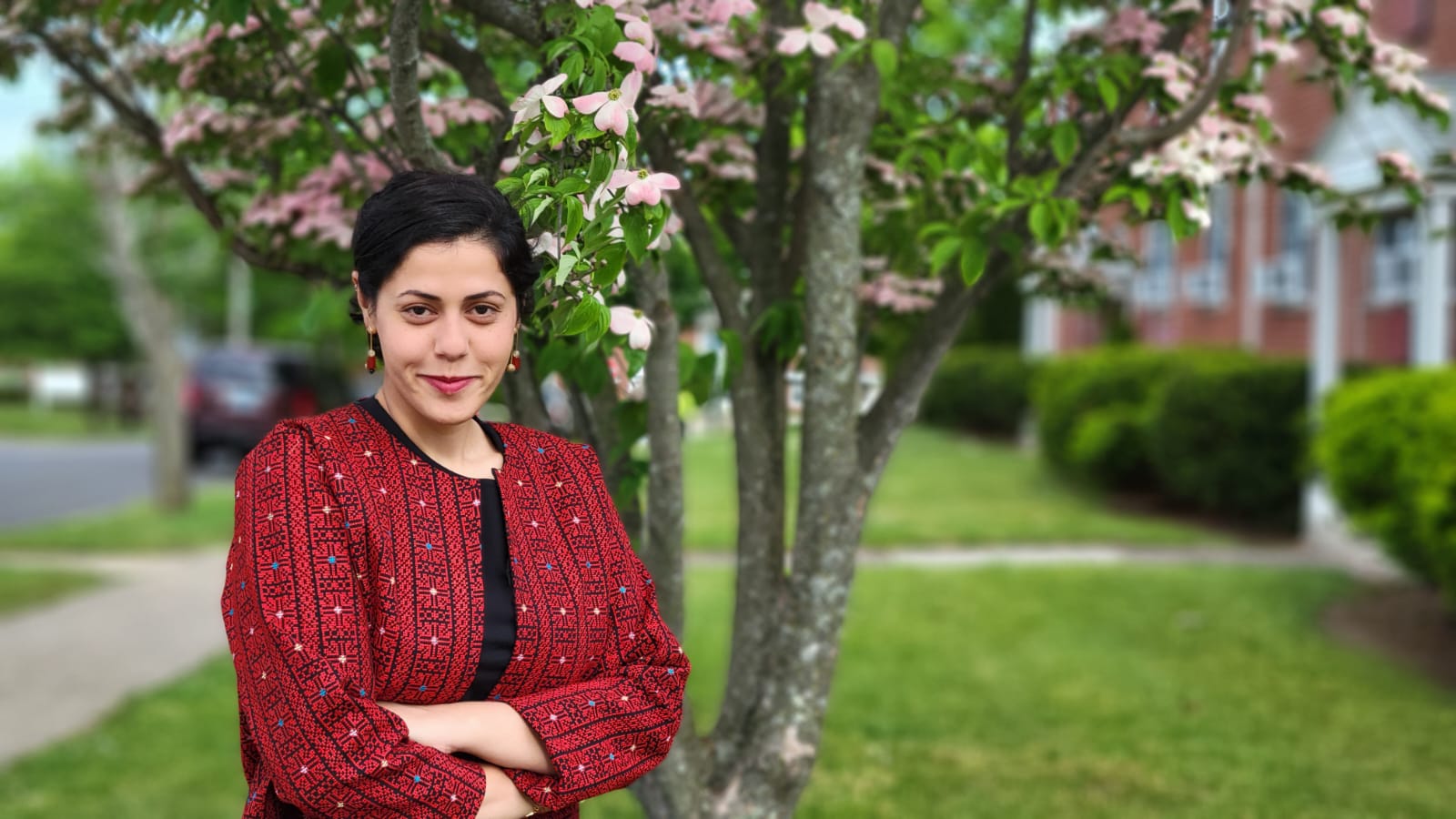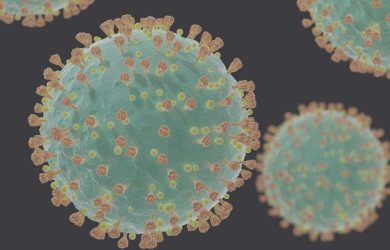
Alaa Hajyahia talks about her research on the way tensions between the state of Israel and the Palestinian community affect people’s everyday choices.
I want to understand how the relationship between the state of Israel and its legal institutions and the Palestinian community affects how the latter think about the choices they make in their daily lives.
Alaa Hajyahia
When she started studying law, Alaa Hajyahia [2022] saw it as a potential instrument for justice, but as she continued the schism between what it says and the political and social context in which it operates brought more questions than answers. Being one of just a handful of Palestinian students at Tel Aviv University’s (TAU) Faculty of Law and Department of Anthropology and Sociology, her time there was marked by many lonely ‘firsts’ and ‘onlys’. This marked absence has solidified her desire to be a scholar of both law and social sciences who can expose the absences and marginalisation that she says are so deeply entrenched in Israeli society.
Her PhD in Social Anthropology, which she starts in the autumn, will take this a step further, providing an ethnographic study of the relationship between the Israeli state, its legal institutions and the Palestinian community at its margins. She says: “Anthropology has consistently helped me bring to light aspects of law that are otherwise hidden, showing that where disciplines meet, legal research can better understand and bring about social change. It is this passion for interdisciplinary research that has guided my academic journey from studying law, sociology and anthropology at Tel Aviv University to pursuing my graduate studies at Yale Law School, to now starting my PhD in legal anthropology at Cambridge.”
“Being Palestinian in Israel, questions of identity are never simple to answer. Normally, I am expected to describe, and think of myself as “Arab-Israeli” rather than “Palestinian”. If I choose to disregard this label, I invite scrutiny almost immediately. How I see myself, and, as importantly, how Israeli society sees me, are deeply interconnected and rife with tensions and contradictions.”
Childhood
Alaa was born in Tayibe, an Arab-Palestinian city which is 80 kilometres from Ramallah in the West Bank and 50 kilometres from Tel Aviv. Alaa, whose family is Muslim, went to local Arab-Palestinian schools where the focus was on educating people for guaranteed jobs because of the political and economic situation. Alaa chose to study law. Science was seen as the main gateway to a good job, but law was viewed as providing a steady job. However, Alaa’s later decision to go further into academia rather than to practice law was a surprise because of fears that it might not lead to a stable job, particularly for someone from a minority background.
Alaa and her two sisters are first-generation university students from a single-parent household. Her sister, Amal, completed her PhD in Pharmacy at the Hebrew University. Eman, Alaa’s other sister, completed her master’s in public health and disaster management at Tel Aviv University. Alaa’s mother considered education very important in terms of both individual and collective social mobility and encouraged Alaa to go to university. Alaa pays tribute to her mother, who had to bring up her daughters on her own. “She did everything for us. Everything I am today I owe to this woman. She is the strongest woman I have met in my life,” she says.
Undergraduate studies
At 20, Alaa moved to Tel Aviv to study law at Tel Aviv University, but she soon began to question the context surrounding her studies. “Very often, Israeli law plays an integral role in the preservation and shaping of a legal system operating in the shadow of occupation and ongoing colonial conditions,” she says. “It is not an easy task to be a Palestinian law student in Israel. This means to study the language and systems that were being used to oppress Palestinians. Once you acknowledge that, it creates dissonances, tensions and paradoxes”.
She adds that another issue was the lack of representation of both law students and professors or lecturers at TAU Law from the Arab-Palestinian community.
In grappling with this absence, Alaa led a faculty-wide academic and social support system that took active measures to increase the ranks of Arab-Palestinian law students at TAU, to improve their academic and professional performance and to maximise their potential for launching a successful legal career. Alaa is very proud that these efforts succeeded in expanding the number of Arab-Palestinians (particularly women) entering the legal profession and in significantly improving their academic and professional achievements. However, through the initiative, Alaa realised that, for it to be sustainable, it had to be supplemented by research that explains and theorises the positionality – sociopolitical, economic, and legal – not only of Arab-Palestinians in Israeli society but other marginalised groups as well.
After finishing law school, Alaa did an internship and then studied for the Bar exam. She started thinking about what she wanted to do next. She had many questions that she had not been able to ask during her undergraduate studies and she knew she wanted to move into the social sciences to try and seek the answers. “I felt you cannot understand law without an awareness of society,” she said. “I believed in law as a powerful tool, but I could see its limitations and felt an interdisciplinary approach was necessary.”
Further studies
So she opted to do a master’s in law alongside a BA in sociology and anthropology, followed by a master’s in anthropology to explore this idea more. She started using social science theories and found they helped her “to bring to life aspects of the law that remained hidden”.
As the former editor-in-chief of the TAU Law Review and the current editor of the Yale Journal of Law and Feminism, she states: “I see the social sciences explaining the law’s potency and shortfalls. These academic and professional experiences helped me to sharpen my legal analysis by drawing on critiques and methodologies from other disciplines such as the humanities and the social sciences.”
Her TAU Law Master dissertation, under the joint supervision of Professors Menachem Mautner and Nissim Mizrachi, focused on what she viewed as the inherent conflict between the support of Israeli Jewish liberals for the Law of Return of 1950, which allows all Jews the right to relocate to Israel and have Israeli citizenship, and their opposition to the Nation State Law, which defines Israel as the nation state of the Jewish People and which many see as enshrining Jewish Supremacy over Palestinian citizens of Israel. Alaa wanted to understand how what she saw as a contradiction was justified. She will present a paper based on her dissertation at the global meeting on Law and Society in Lisbon this summer.
Yale Law School
Alaa first went to Yale after winning a Yale Fox International Fellowship, a graduate student exchange programme. This experience of studying abroad, in particular at Yale Law School, one of the most prestigious law schools in the world, was a huge shock. “It was the first time I experienced at close hand how people of my age were living in other parts of the world,” she says.
At Yale, Alaa wrote several papers. One of them won the Yale Law Women Critical Race Theory Annual Award. Under the supervision of Professor Paul Kahn, Alaa has been working on a research study which seeks to isolate underlying assumptions that shape the European Court of Human Rights’ narratives, understandings and assumptions – as well as that of legal scholars generally – regarding Muslim women who wear the Islamic veil. She says these assumptions shape the Court’s decisions. Her study seeks to challenge them and to suggest alternative ones. One of the foundational assumptions made by the Court, she says, is that it must act from the place of the ‘saviour’ to ‘liberate’ these Muslim women, who must (even if they do not realise it) be ‘victims’ of oppression.
Drawing on the work of number of distinguished anthropologists, who she sees as an intellectual inspiration, such as Saba Mahmood, Talal Asad and Lila Abu lughod, Alaa proposes an alternative prism that situates Muslim women neither as ‘political’ nor ‘suffering’ others, but as morally evaluative humans distinctly and deeply informed by their unique cultural experiences. “In doing so, I seek to rebuke the essentialist jurisprudence that binds Muslim women in a one-dimensional understanding of freedom, agency and will,” she says.
Cambridge
For her PhD at Cambridge she will continue this work, but focusing closer to home on the way tensions between the state of Israel and the Palestinian community affect people’s everyday choices. “It’s a complex relationship and I want to uncover the diverse narratives of citizenship and belonging,” she says. “I want to understand how the relationship between the state of Israel and its legal institutions and the Palestinian community affects how the latter think about the choices they make in their daily lives.” Her supervisor will be the social anthropologist Professor Yael Navaro.
Alaa says couldn’t do her PhD without Gates Cambridge’s financial and social support. When she applied she says she didn’t realise how significant the scholarship was and is now becoming more and more excited about being part of such an interdisciplinary, international community. “I could not be happier or more enthusiastic to be included in the 2022 Gates cohort,” she states. “This is a space that I really enjoy being part of intellectually. I’m excited to be part of the Gates Cambridge community and to be challenged by my colleagues.”












